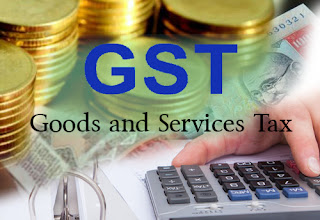In part 1 of this series we collected the basic
information about the GST, various types and there befit that it will bring to
the various stakeholders. In this article we will dive deeply and would see how
various rates are settled so that it becomes a game changer by applying one tax
slab across the nation.
GST council- after the 101th amendment bill the GST council was set up. This is an apex body comprising of centre and states for GST. It has also the power to resolve the disputes. It's total strength is 33, the council is headed by the union finance minister, the union revenue secretary will be ex- officio secretary to the GST council, while the chairperson of the central board of excise and customs ( CBEC) will be a permanent invitee( have NO VOTING powers ) to all proceedings of the council.
Click here to read: GST - The game changer or One nation one tax : Part 1
Also read: Best way to prepare for SSB from your home
Council will have one
member each from 29 states and 2 members each from 2 union territories.
Every decision of the council will be taken at a meeting by a majority of not
less than 3/4 of the weighted votes of the members present and voting. And the
good thing about this council is that the voting college has been structured in
such a way so that neither centre nor all states together can apply veto. Because
the vote of the central Govt will have a weight-age of 1/3 of the total vote cast and the votes of all the state Govt and union
territories taken together will have a weight-age of 2/3 of the total votes cast. And any decision will require 3/4 of total
votes.
Decisions taken by GST council: Threshold limit: for GST the exemption limit for GST is
fixed at 20 lakhs and 10 lakh for the business in north east states and 3 hill
states j&k, uttarakhand and himachal Pradesh. It means that traders below
the turnover of above mentioned rupees will be exempted to register under the
GST. From this many small scale traders and service providers would get benefit
GST rates: Now it is the most contentious issue in implementation
of the GST. Centre has decided to levy the GST in four tax slabs and has decided the list of items for different tax
rates which are as follows:
·
Merit rates -
essential goods and services
·
Standard rates -
goods and services in general
·
Special rates - precious
metals
·
Nil rate - exempted
goods and services
Now it is said that because of these different tax slabs for different items the prices of the goods and services will not be same in every states according to the different conditions at each state, also there are other decisions taken by the GST council like area based tax exemption and gross empowerment and composite scheme, also the Govt has decided to create a 50000 core rupees fund for the compensation of the states losing revenue because of GST and instead of giving this compensation from the consolidated fund, the Govt has decided to levy 1 per cent extra cess on the goods and services under the GST so it will again bring the burden on the consumers. Technically GST will have 7 rates, so it is not as simple as it looks, In a country like ours if it is not implemented effectively it is not surprising that GST can be proved merely a name changer instead of game changer.
Click here to join our Facebook page SSB VISION
Also read: Do you have OLQ ( Officer Like Qualities ) in me?
Hope you like our efforts to keep aspirants updated about
the latest happenings. Keep reading and following us for latest updates related
to defense. If you have any queries do write to me at my email id. Apply for
email subscription so that you do not miss any important update. Share the page
with your friends and other defense aspirants.
About the Author:
Vikas is from Chandigarh who is a NCC ‘C’ Certificate holder and has a dream of serving the nation. With this article he wants to help other aspirants for preparing them in general awareness.
|



No comments:
Post a Comment